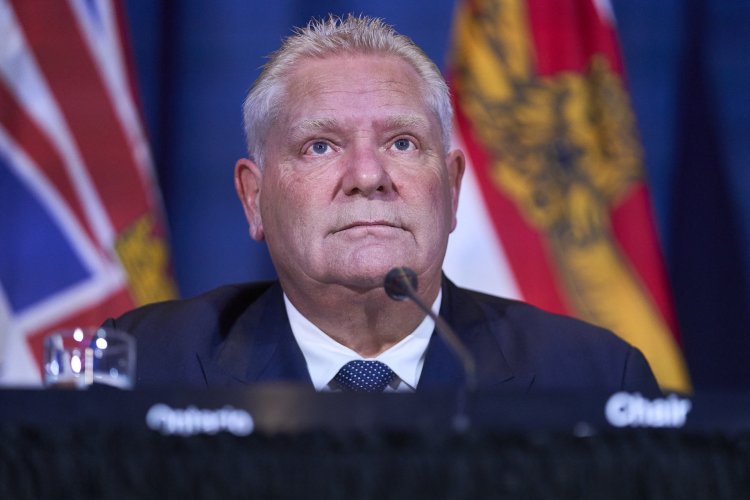‘It’s the Tariffs, Stupid’: Ontario Premier Doug Ford Speaks Candidly on Canada Elections
Canada is set to conduct its most significant election on Monday. Here’s the perspective of the country’s most prominent Conservative leader on how he believes it will unfold.

Ford's latest smart move may have been his call for a snap election earlier this year, leading his Progressive Conservatives to a substantial victory. However, it's the strategy he employed to secure this win that offers valuable lessons.
Wearing a blue "Canada Is Not For Sale" cap, which resembled a MAGA hat, he positioned himself as "Captain Canada," even threatening to cut off power to American households. Vocal against President Donald Trump's tariff and annexation threats, Ford became a frequent presence on both American and Canadian television during a particularly uncertain time, right after former Prime Minister Justin Trudeau's announcement of his resignation and before Prime Minister Mark Carney's takeover. He traveled between Toronto and Washington, promoting the Fortress Am-Can initiative designed to strengthen ties between Canada and the United States against China.
Ford believed he was demonstrating how Conservatives could approach the ongoing federal election, set to conclude Monday. Yet, to his confusion, Conservative leader Pierre Poilievre's campaign style deviated from the pro-Canada stance he had embraced.
In a recent conversation within his office at Queen’s Park—an ornate building that reflects 19th-century state architecture—Ford expressed his disappointment in Poilievre’s approach to campaigning. Surrounded by imagery representing Ontario, including photos of Winston Churchill and his late brother Rob Ford, the former Toronto Mayor, he candidly discussed Poilievre’s coalition-building shortcomings, their political rivalry, and his recommendations for running the federal campaign. They discussed the emerging contest to lead Canada’s Conservatives if Poilievre does not succeed, highlighting a premier who has already begun positioning himself for potential leadership.
This discussion has been edited for length and clarity.
“Have you seen this ad that Nova Scotia Premier Tim Houston has? It about made me want to go spend the summer there — it was a good sell; he’s selling that province,” Ford commented.
“Selling himself for leadership, that’s what I figure. I busted his chops, I said: ‘Can’t you wait till the body gets cold first?’” [Editor’s note: Houston is widely seen as having ambitions to succeed Poilievre should the Conservative leader be deposed after the election.]
“This has been some campaign. This election feels like it’s as much about our craziness as anything else in Canada.”
“Yeah, I don’t disagree. But we’ll see what happens on the 28th; it’ll give us a little bit of certainty. I say a little bit because I think it’s going to be a minority government either way.”
“Have you ever seen anything like this? You’ve been in politics a long time. Your family obviously has. Does this remind you of anything? Or is this a total outlier?”
“This is an outlier. Who would have ever thought in January that we’d be going to the polls and then the feds would be, too, and that the prime minister would step down! No one would have thought.”
“And you were sort of the de facto prime minister for six weeks, right? Or Captain Canada, at least.”
“We had to protect the rest of the country. No one else was standing up, per se.”
“And the pitch was good. The Am-Can was a really smart idea and a way to get to Trump to think, ‘Hey, China’s the real issue here.’”
“Absolutely it is. It’s still the real issue. I’ve been saying that for a few years now. We have to keep an eye on China, and it’s come to fruition. Hopefully, we can get through this and put a ring around, as they say, the Am-Can fortress.”
“Obviously, you scared the shit out of Commerce Secretary Howard Lutnick on cutting off electricity, and he responded. But have you been able to get to Trump at all and pitch the Am-Can at all?”
“No.”
“I think Trump would like that.”
“I’m sure he would. But he thinks he’s taking over Canada. We can work together, have a strong alliance without saying that they’re going to take over the country.”
“What drives that? Is that because he thinks that Canada has a better economic deal going, and we’re kind of the same, so we might as well just be one big country? Is it that simple?”
“Well, I think when Trudeau went to visit him, Trudeau said that we’d get annihilated if this deal doesn’t go through. Either way, when you tell Trump that, his ears pop up, and bingo, he’s latched on ever since.”
“Did this start as a way just to screw with Trudeau, do you think?”
“I think it started that way. Absolutely. And then he just kept going.”
“Don’t you think Trump and Carney would actually get along better? Because Trudeau is the kind of person Trump would hate. Whereas Carney is the kind of person Trump has been trying to impress for 50 years: Harvard, Goldman Sachs, all the credentials.”
“And Brookfield, a chair at Bloomberg.”
“All those credentials are the ones Trump looks for and craves.”
“We’ll see what happens. If Mark wins, I think we’ll have a half-decent relationship. Because they’re all from that New York group, Lutnick, the whole thing.”
“One thing that seems unusual for Canada in this race is the threat of Trump has elevated the two major parties here and marginalized the minor parties because folks don’t want to waste their vote.”
“100 percent. The New Democratic Party shifted — they’re in a freefall. And their votes usually go to the Liberals. That’s what’s going to make the difference. You have to win Ontario.”
“Yeah, talk to me about Ontario.”
“You have to win Toronto and the Greater Toronto area. And if you win those two areas, more than likely you’ll win the country.”
“But it doesn’t sound like Poilievre is getting that done right now.”
“It doesn’t appear that way. So we’ll see what happens.”
“Somebody told me that the two of you have never really met in person. How is that possible?”
“You’re going to have to ask him. I think seven years ago, I met him once in Ottawa. A breakfast right after one of my events. But we never really talked there.”
“That’s malpractice on his part. Why wouldn’t he make the effort?”
“You’re going to have to ask him that. But I think it’s common sense when you’re in an election, you reach across to as many people as you can.”
“But apparently he doesn’t have a relationship with the premier in Nova Scotia either.”
“Yeah. Not at all. Or local mayors. Or anyone. I don’t understand it.”
“And he worked in politics; he understands politics.”
“It’s his campaign manager, Jenni Byrne, in my opinion. But he’s still the boss, right?”
“Yeah, you’re the principal. You’re the candidate. Somebody told me it’s because in an earlier life, Byrne worked for you and one of your staffers fired her.”
“Absolutely. That’s pretty accurate.”
“A 15-year-old staff fight is the reason he’s pissing away the biggest endorsement in Ontario?”
“I don’t understand. I don’t understand it.”
“Has Carney reached out to you at all?”
“Yes. And I have an obligation as the chair of the federation that represents all the premiers that changes every year — it falls on my lap this year ironically.”
“He said all the right things?”
“Very nice.”
“Is part of Poilievre’s challenge stylistically that he's a little too much like Trump?”
“I don’t know about that. Trump’s unique. But there are four or five different types of conservatives across the country. You’re focusing on your base when you should be focusing maybe on other areas like Ontario.”
“The G7 is meeting in Alberta this summer. Is Canada going to have to think about its security alliances, too, going forward?”
“It’s critical. Number one, Canada has to meet its 2 percent NATO commitment. And it’s easy enough to do: Buy more planes, maybe ships from the U.S. We’re not far away. We spent 1.4 percent. We need to get up to 2 percent. It can be done.”
“Do you think this will be the impetus — the current unpleasantness — to get to 2 percent?”
“It has to. We’re all in favor of it. All the premiers.”
“If the U.S. isn’t reliable, you need to start arming yourself?”
“I think they’ll always be reliable. We’d be in deep trouble if they weren’t. And we make so many different components for your military, and the critical minerals.”
“Well, that brings up something looming out there that nobody wants to talk about, but I think is important. There’s talk in Alberta about the possibility of a ballot measure about secession. Obviously, it’s a loud but fairly small group that’s eager to do that. But what happens when somebody tells Trump or Trump figures out that the minerals and the oil and gas that he craves most in this country is mostly in one part of the country? And it happens to be in the part of the country that’s putting a ballot measure that wants to secede from Canada. Is that a little dangerous?”
“I think it will be. We’re a little worried here in Ontario. We have more critical minerals than anywhere in the world. They have a ton of oil in Alberta. Why don’t we leverage that and all work together? It’s the easiest thing. Because China is cutting the U.S. off with their critical minerals that they need for their military and aerospace manufacturing. And who has it? We have it here.”
“I just worry about Trump finding out that some in Alberta want to leave and saying ‘alright…’”
“He’ll find out.”
“And then he says, ‘come on in, water’s warm.’”
“Absolutely.”
“What’s your bottom line? How concerned are you about the U.S.-Canada relationship? Do you think things will be better a month from now?”
“I’m really hoping so. I always look at the glass half full. And I’m hoping we can get this done. I think with some tough conversations, back and forth, I’m confident we’ll get it done.”
“When you and Carney talked, did you tell him the importance of getting this thing done?”
“Oh, 100 percent.”
“What does he say?”
“He agrees. He spent a lot of time in the U.S. like I did. And he understands. You can’t just all of a sudden cut off your largest customer on both sides. The U.S. is our largest customer. We’re their largest customer. And he just can't say no.”
“Even hardcore Trump supporters — one guy said to me, ‘I love Trump. I think I’ll vote for him. But I can’t stand that he’s attacking our little brother.’ That's what he said.”
“Especially if you live on the border and you fish or hunt up here, you have a summer place up here; you’ve been up here over the years, it’s bizarre to suddenly be adversaries.”
“Millions and millions of people go back and forth across the border.”
“Seemingly every person I’ve met the past three days here said, ‘Oh yeah, I’ve got a place in Florida or a place in Arizona…’”
“So there are 3.2 million visitors to Florida every year from Canada. They own $30 billion worth of real estate. They pay a billion in taxes. They spend $11 billion a year in Florida. And now, people have stopped going.”
“One last thing: If you were running for prime minister, if you were the Conservative leader, how would you have pivoted once Trump became the issue? Once Trudeau stepped down and this race was no longer about Trudeau and was about Trump, what would you have done?”
“I’d have a deal within a month of the day I got elected. I feel like I could talk to him.”
“Because Poilievre never pivoted towards a Trump-centered election. He never recognized that once you lost Trudeau, you lost the carbon tax, and you had to make a switch.”
“100 percent. I ran my whole election on Trump and protecting Ontarians, protecting communities and jobs and businesses.”
“Right, like the Carney campaign now.”
“I didn’t keep any secrets. I told Pierre; he called me once after a little while — people said, ‘You’ve got to call him’ — and said: ‘What advice can I get?’”
“It’s one thing; our polling shows it. We just came off a big victory. It’s the tariffs. A number of years ago, James Carville said, ‘It’s the economy, stupid.’ Well, it’s the tariffs, stupid. That’s what it is.”
“Why didn’t he do it?”
“I can’t figure it out.”
“By the way, that phone call must have been hard to make. Did somebody put a gun to his head?”
“That’s exactly what happened.”
Allen M Lee for TROIB News
Find more stories on Business, Economy and Finance in TROIB business












